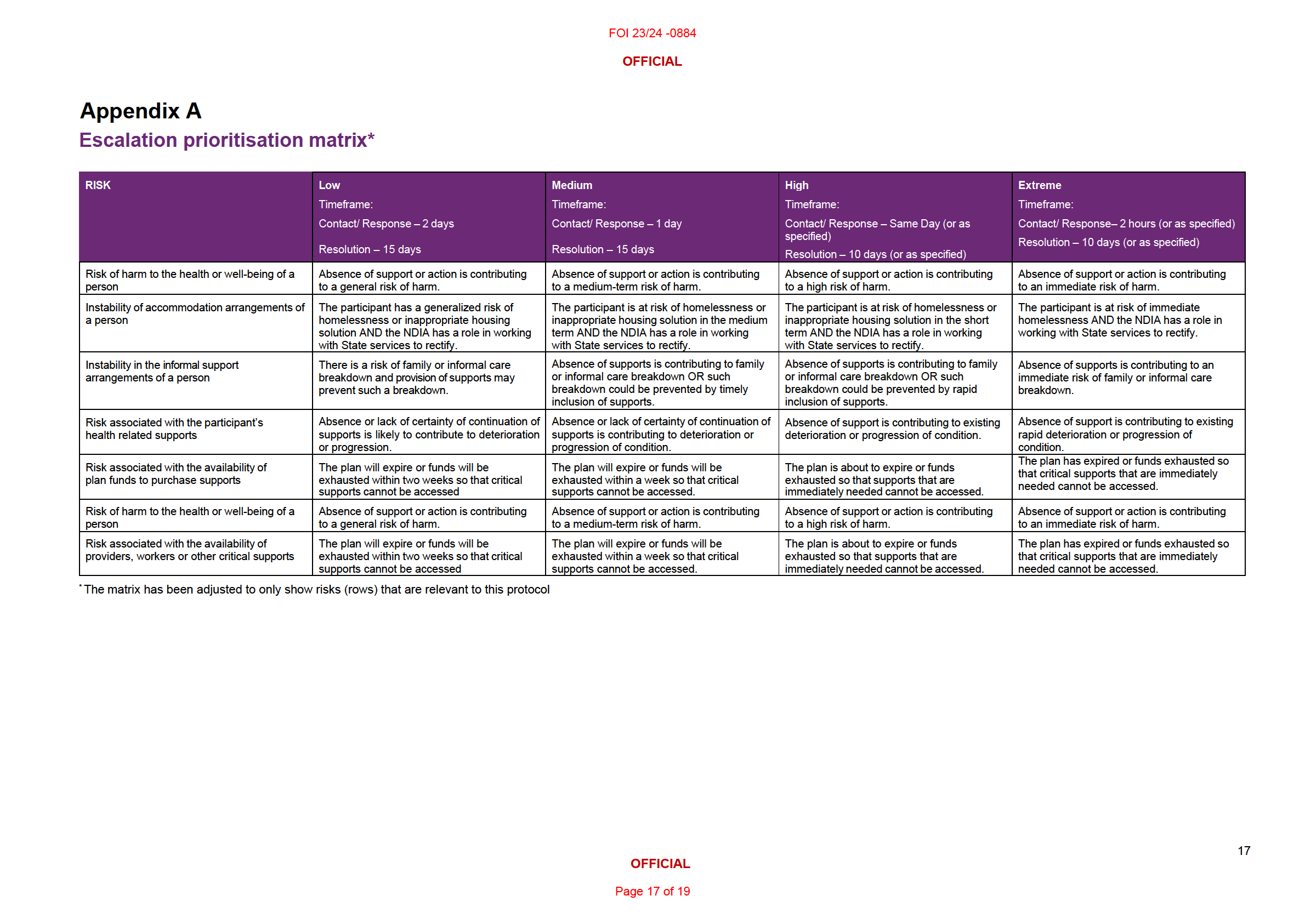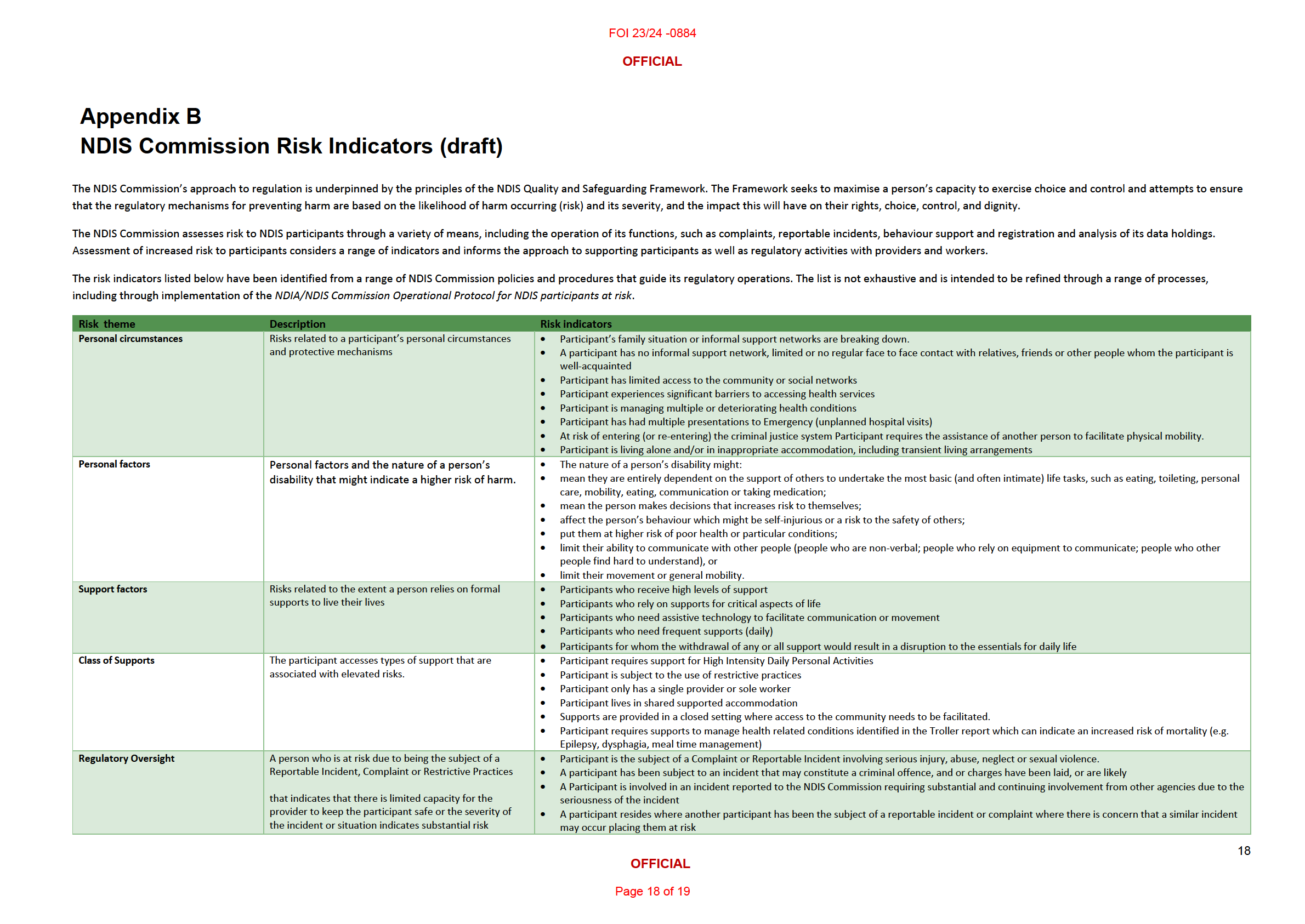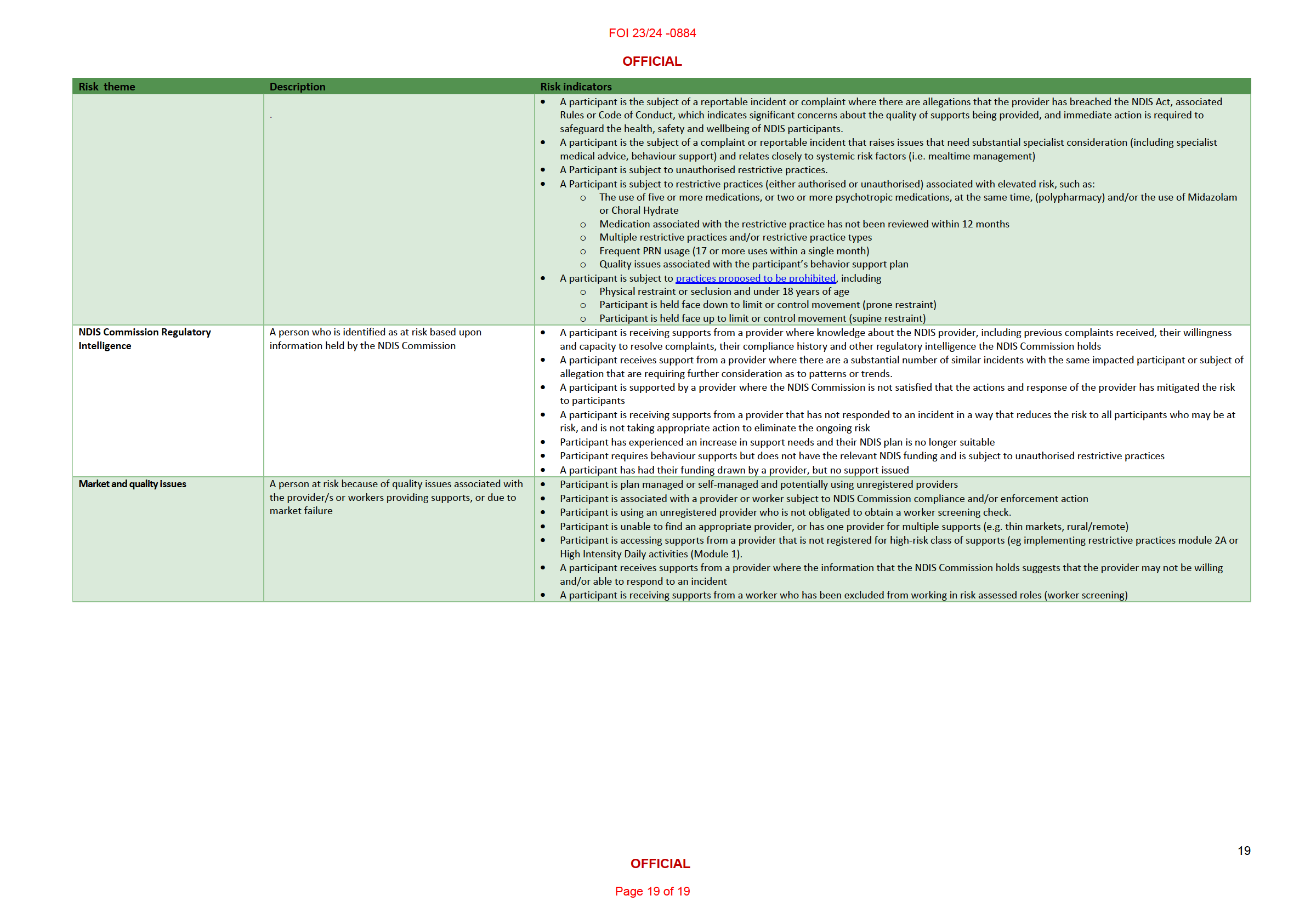
FOI 23/24 -0884
OFFICIAL
Operational Protocol for NDIS
participants at risk.
As agreed between the National Disability Insurance Agency and the NDIS Quality and
Safeguards Commission
Date: July 2022
For internal staff use only – not for distribution
V1.0 July 2022 – Operational Protocol for NDIS participants at risk
1
Page 1 of 19
FOI 23/24 -0884
OFFICIAL
Contents
Version Control ..................................................................................................................... 3
About the Operational Protocol ................................................................................................. 4
1.
Purpose ............................................................................................................................ 4
2.
Relevant Areas of Interface .............................................................................................. 5
3.
Defining participant risk .................................................................................................... 5
4.
Identifying NDIS participants at risk ................................................................................. 5
5.
Joint Operational Response ............................................................................................. 7
Proactive operational response ........................................................................................ 7
Reactive operational response ......................................................................................... 8
6.
Governance .................................................................................................................... 12
7.
Related Documents ........................................................................................................ 12
8.
Key Contacts .................................................................................................................. 14
Appendix A ......................................................................................................................... 17
Escalation prioritisation matrix* ...................................................................................... 17
Appendix B ......................................................................................................................... 18
NDIS Commission Risk Indicators (draft) ........................................................................... 18
OFFICIAL
2
Page 2 of 19
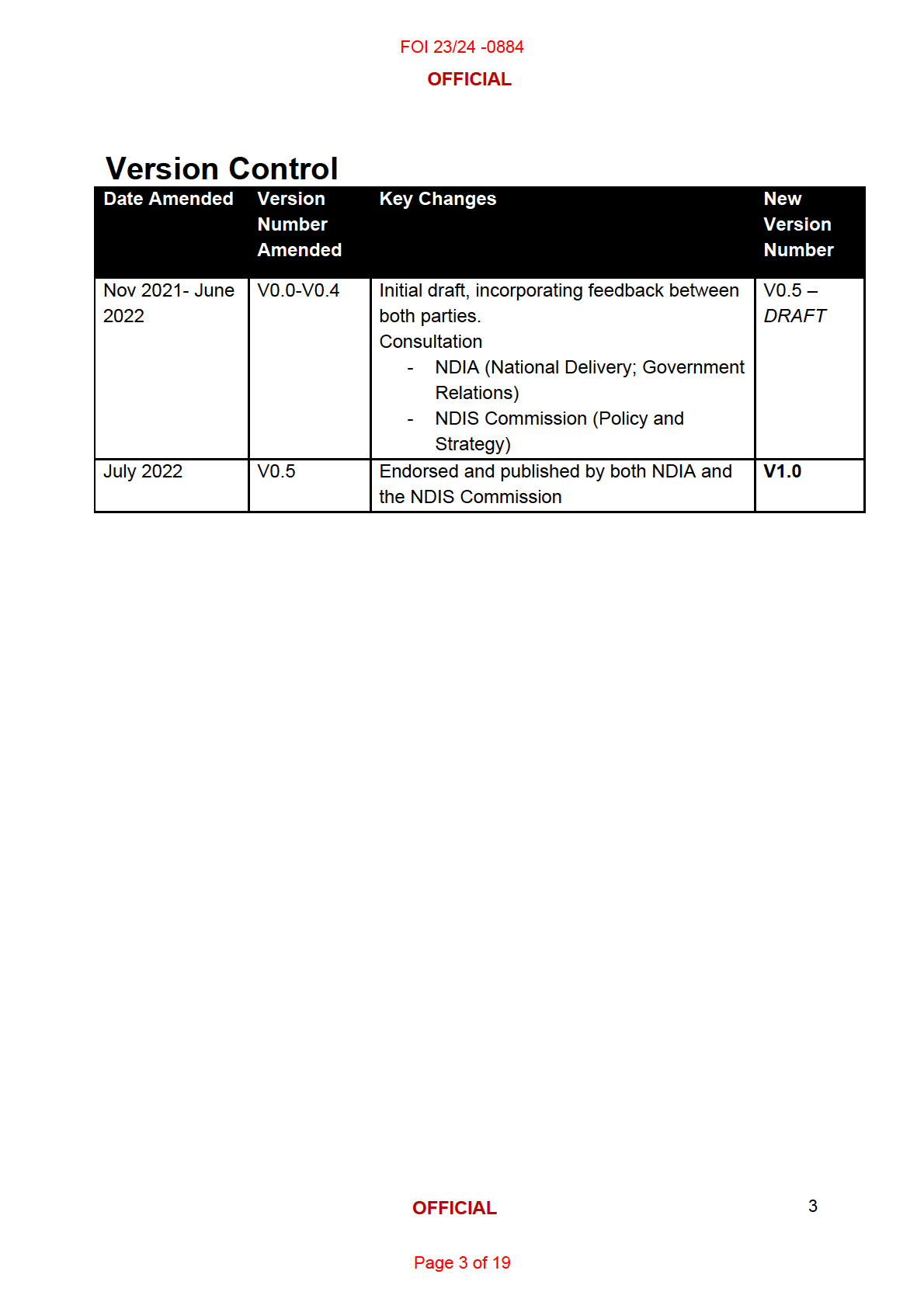
FOI 23/24 -0884
OFFICIAL
About the Operational Protocol
The National Disability Insurance Agency (NDIA) and the NDIS Quality and Safeguards
Commission (NDIS Commission) agreed an information sharing Statement of Intent in June
2018 to work collaboratively in supporting each other to perform individual and shared
responsibilities under the
National Disability Insurance Scheme Act 2013 (NDIS Act).
The NDIA and NDIS Commission each have authority under sections 60 and 66 (the NDIA),
67A and 67E (the NDIS Commission) of the NDIS Act to disclose information to each other:
• For the purpose of the NDIS Act this includes purposes that are relevant to achieve the
functions of each under the Act;
• With the express or implied consent of the person to whom the information relates
(including consent of an authorised representative). Where practicable, express consent
will be sought rather than relying on implied consent;
• If either party reasonably believes that the disclosure of the information is for the
purpose of, or in relation to, preventing or lessening a threat (whether current or future)
or reporting a past threat, to an individual’s life, health or safety; or
• Where the CEO of the NDIA or Commissioner of the NDIS Commission is satisfied on
reasonable grounds that it is in the public interest to disclose the information;
This Operational Protocol is agreed between the NDIA and the NDIS Commission.
The NDIA and NDIS Commission will jointly monitor the implementation of this Operational
Protocol and review its operation every 6 months.
1.
Purpose
The National Disability Insurance Agency (NDIA) and the NDIS Quality and Safeguards
Commission (NDIS Commission) are committed to supporting NDIS participants who, through
data and risk indicators and assessment, are identified as 'at risk’.
This protocol is consistent with the principles of the NDIS Act 2013 which gives effect to
Australia’s obligations under the UN Convention on the Rights of Persons with Disabilities
(UNCRPD). Particularly that people with disability have the right to fulfil their potential and live
free from harm; including violence, abuse, neglect, exploitation and discrimination. Following
the 2020 Robertson Review failings were identified in how the NDIS Commission and the NDIA
carried out their functions and a number of recommendations were made in order to help
strengthen supports for participants at risk. This protocol addresses Recommendation 1 of that
review.
The 2021
NDIS Amendment (Improving supports for at risk participants) Bill (
Bill) further
strengthens the NDIS Commissioner’s compliance and enforcement powers with the intent to
fortify supports and protections for NDIS participants. This Bill amends provisions in the NDIS
Act to support the implementation of changes in response to Robertson Review
recommendations 1, 5, 6, 7, 8 and 9, and improves supports and protections provided to NDIS
participants.
This protocol will outline the roles and responsibilities of the NDIA and NDIS Commission in
order to identify and respond to matters for participants who are identified as being at risk, in a
timely manner.
OFFICIAL
4
Page 4 of 19
FOI 23/24 -0884
OFFICIAL
2.
Relevant Areas of Interface
Priority work intersection
Once fully implemented, this protocol will inform the NDIA Participant Safety policy, as well as
work the NDIA is completing on family violence orders and support for decision-making.
This protocol will also complement escalations and reporting mechanisms, such as:
-
NDIA Participant Critical Incident Framework
-
NDIA Complaints and Feedback Framework
Other Joint protocol intersection
-
NDIA and NDIS Commission Complaints Handling and Reportable Incidents
Operational Protocol.
-
NDIA and NDIS Commission Complex Supports Operational Protocol
-
NDIA and NDIS Commission Data Access Transfer Operational Protocol
-
NDIA and NDIS Commission Market Stewardship & Oversight
-
NDIA and NDIS Commission Regulatory Interface Operational Protocol
3.
Defining participant risk
The NDIA and the NDIS Commission have related but different roles in identifying,
mitigating, and responding to participant risks. As the implementing agencies of the NDIS,
there is a need to have a shared understanding of risk, to inform the sharing of information
and how the agencies will work together to mitigate and respond to participant risks.
This shared understanding of risk will evolve over time as learnings are taken from
participant/provider interactions, data analysis and research into best-practice. Further work
will be done to define participant risk through the drafting of the NDIA Participant Safety
Policy and the NDIS Commission Participants at Risk Policy.
It is important to note that a person’s disability does not immediately infer that they are at risk
of harm. However, a person’s disability, combined with their individual circumstances, access
to protective mechanisms and quality of supports might contribute to, or increase the
potential risk.
At each stage of a participant’s interaction in the NDIS, consideration must be given to how
the participant’s disability, personal history, personal circumstances and quality of supports
might contribute to their level of risk and what the responsibilities of the NDIA and the NDIS
Commission are to ensure that participant’s safety.
4.
Identifying NDIS participants at risk
The NDIA and NDIS Commission have developed and agreed upon participant risk
indicators at both an individual and population level. Further improvement of data exchange
and sharing between agencies has commenced under the existing NDIS Commission and
NDIA Data Access Transfer Operational Protocol.
Current risk indicators within the NDIA were identified through five main sources:
1. Business intelligence
2. At-risk participant COVID response logic
OFFICIAL
5
Page 5 of 19
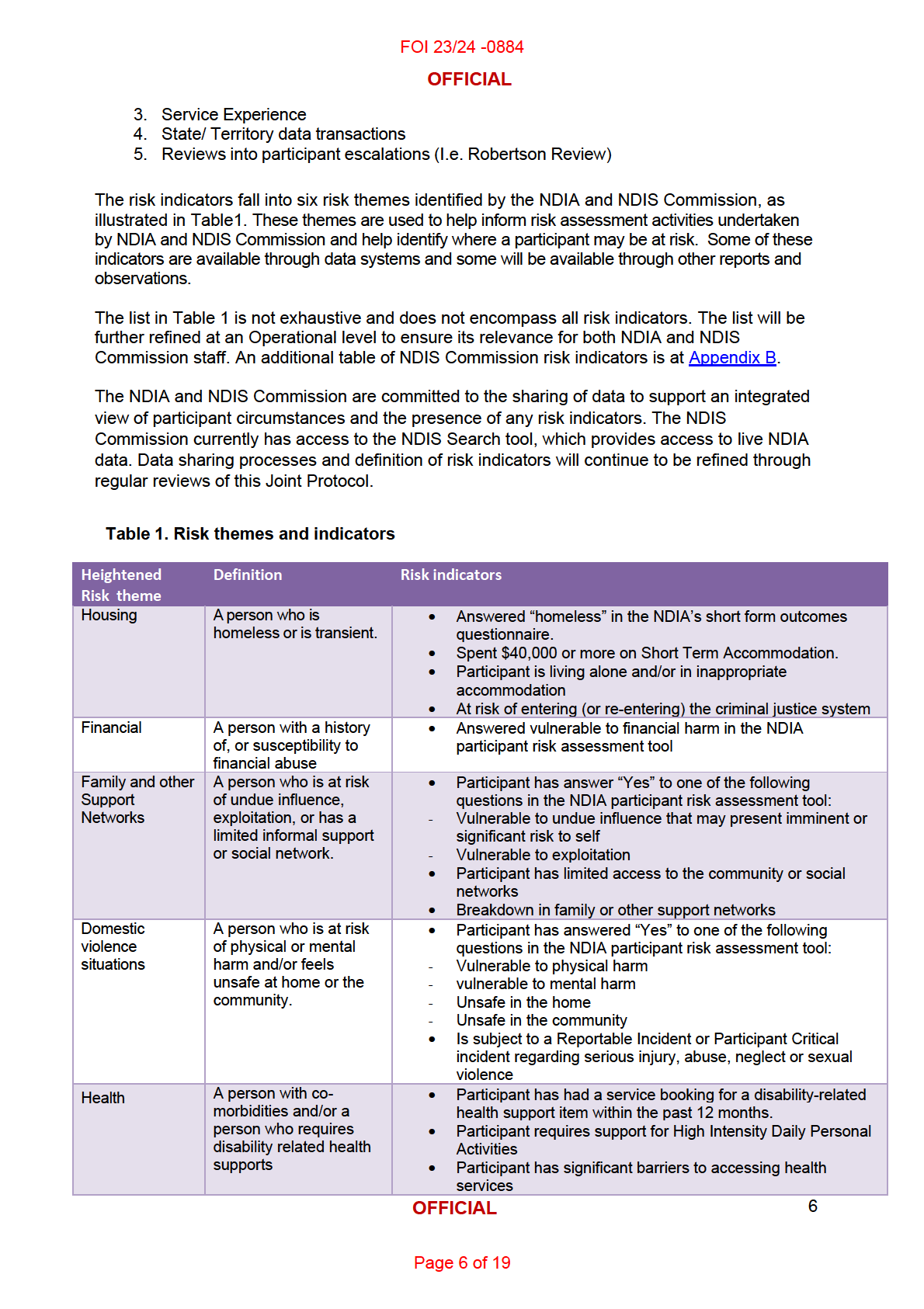
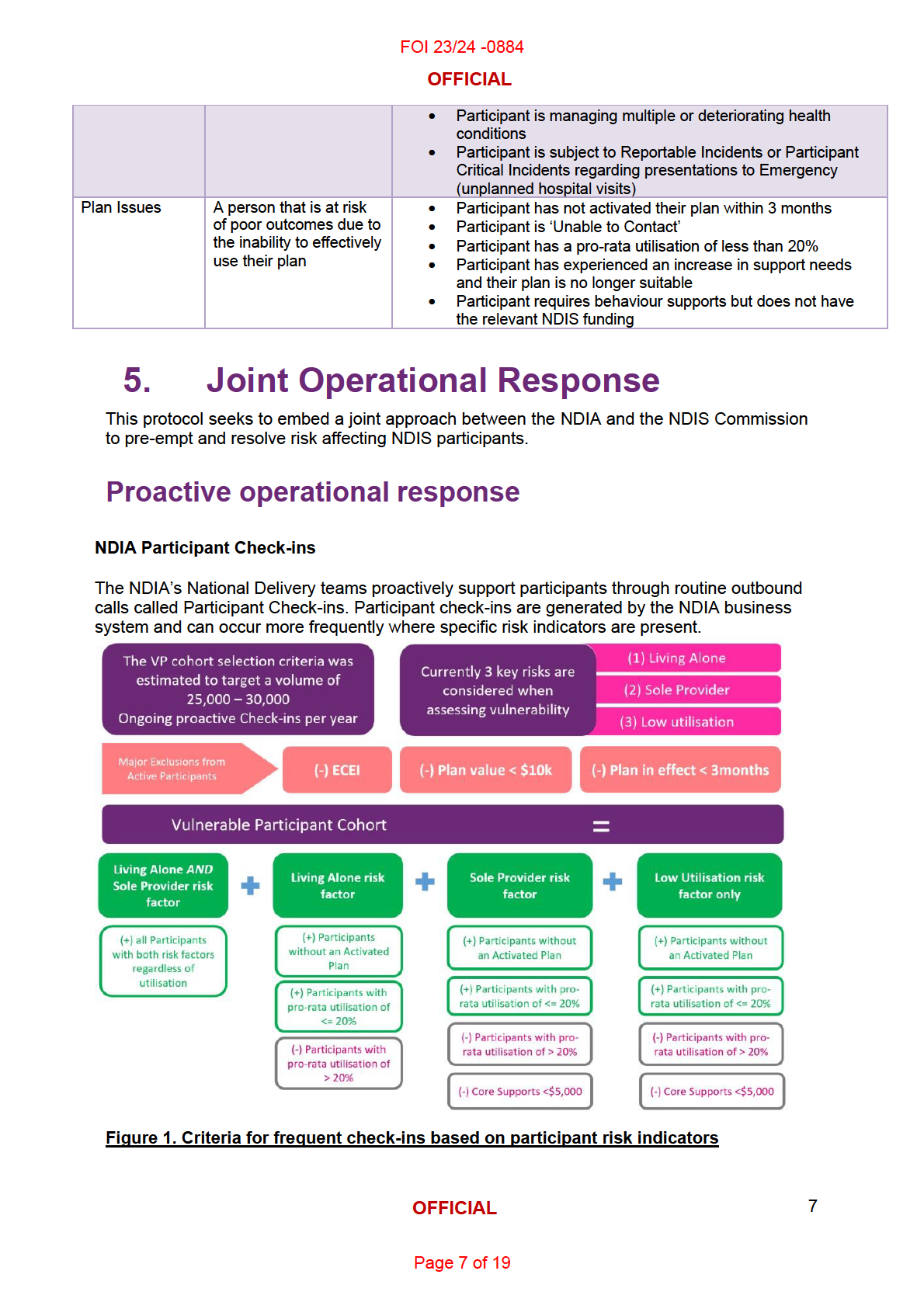
FOI 23/24 -0884
OFFICIAL
The Participant Check-in requires NDIA staff and partners to:
• Contact the participant to check their welfare and wellbeing
• Check the NDIS plan utilisation and connection with providers
• Check for other vulnerabilities/risks based on the risk indicators or other business
intelligence
• Check participant record for any NDIS Commission related activities
• Engage a support coordinator (if required)
• Refer to mainstream or community services
• Refer relevant provider or worker quality and safety matters to the NDIS Commission
• Document and agree to the next check-in.
NDIS Commission Site Visit Policy
The NDIS Commission has responsibility to ensure NDIS providers are meeting their
obligations. Whilst gathering and verifying information for the NDIS Commission, staff should
visit sites where services are delivered wherever possible. Site visits provide a higher level of
scrutiny through first-person observation and can identify risk where it may not have otherwise
been visible.
In order to monitor compliance of providers, the NDIS Commission also has a role in directly
engaging with participants, guardians and family members. This includes face to face visits
where risk factors have been identified through local or national compliance activities and other
regulatory functions.
A site visit can also be undertaken as a reactive response to a participant risk issue identified
by the NDIS Commission or by the NDIA under this protocol, to monitor provider compliance
with the NDIS code of conduct and, where applicable the NDIS practice standards.
Reactive operational response
Existing Protocols:
The NDIA and the NDIS Commission have a number of joint protocols that outline how the
NDIA and the NDIS Commission will work collaboratively to perform individual and shared
responsibilities under the National Disability Insurance Scheme Act 2013 (NDIS Act). All
existing joint protocols can be found on each agency’s intranet site, and are available internally
to all staff.
The
Complaints Handling and Reportable Incidents Operational Protocol sets out the
agreed roles and responsibilities of the NDIA and the NDIS Commission in regards to the
effective management and resolution of NDIA
participant critical incidents (PCIs), NDIS
Commission
reportable incidents (RIs) and
complaints. The full definition of a PCI, RI and a
complaint is outlined in the protocol.
Where a participant is identified as being at-risk and there is also a PCI, RI or a complaint, the
Complaints Handling and Reportable Incidents Operational Protocol should be followed in the
first instance.
The
Complex Supports Operational Protocol sets out the agreed roles and responsibilities of
the NDIA and the NDIS Commission in regards to participants who require behaviour supports
and who may be subject to, or at risk of being subject to, restrictive practices.
OFFICIAL
8
Page 8 of 19
FOI 23/24 -0884
OFFICIAL
If the matter cannot be resolved via the existing joint protocols, staff can follow the Reactive
Escalation response outlined within this protocol.
Business As Usual:
It is expected that matters identified as low risk can generally be managed via business as
usual operations, without the need for a joint operational response.
Business as usual arrangements are the contacts, relationships and processes established by
the NDIA, NDIS Commission and mainstream agencies. Business as usual arrangements
recognise the practical benefit of close working relationships on the ground and resolving
matters as close to the person as possible.
The vast majority of matters, including routine requests for updates related to a NDIS
participant or a service provider, are to be resolved in line with the respective business as
usual arrangements for the NDIA and NDIS Commission. They may include matters relating to
NDIA access, planning and reviews, or provider-related queries or concerns.
Joint Response:
Where a participant is identified by either organisation as being at risk, and the related matter is
not more appropriately responded to under an existing joint protocol, the NDIA and NDIS
Commission have agreed to a tiered escalation response. This response is based on the NDIA
Escalation prioritisation matrix at Appendix A, and will be developed further, following
workshops with operational leads.
Low/Medium Risk Response
Matters that are identified via the Escalation prioritisation matrix as
low or
medium risk are
required to be addressed at the NDIA or NDIS Commission EL2 Director level or equivalent.
Matters may escalate to this level if they are unable to be resolved via BAU processes.
An initial response is due within 1-2 business days. A resolution, or significant progress
toward a resolution, is due within three weeks.
High Risk Response
Matters that are identified via the Escalation prioritisation matrix as
high risk are required to be
addressed at the NDIA State/Branch Manager level, with escalation receipt and involvement
from the NDIS Commission State/Territory Director or Branch Head Operations.
Matters may escalate to High risk if:
• They are unable to be resolved via a low/medium risk response
• There is a dispute existing over the interpretation or implementation of operational
policy.
• There are complex issues relating to the Applied Principles and Table of Supports
(APTOS)
• There are systemic provider issues, including regulatory non-compliance.
An initial response is due the same day. A resolution is due within
2 weeks or immediately as required.
Extreme Risk Response
OFFICIAL
9
Page 9 of 19
FOI 23/24 -0884
OFFICIAL
Matters that are identified via the Escalation prioritisation matrix as
extreme risk should be
escalated immediately. The matter will be addressed at the NDIA General Manager/NDIS
Commission Branch Head Operations level or equivalent with notification to the following
representatives:
• NDIA CEO, DCEO Participant Experience Delivery, General Manager National
Delivery, and relevant State/Territory Manager
• NDIS Commissioner, Complaints Commissioner, and Senior Practitioner or Registrar
where relevant.
An initial response is due within 2 hours. A resolution is due within 10 days or immediately as
required.
OFFICIAL
10
Page 10 of 19
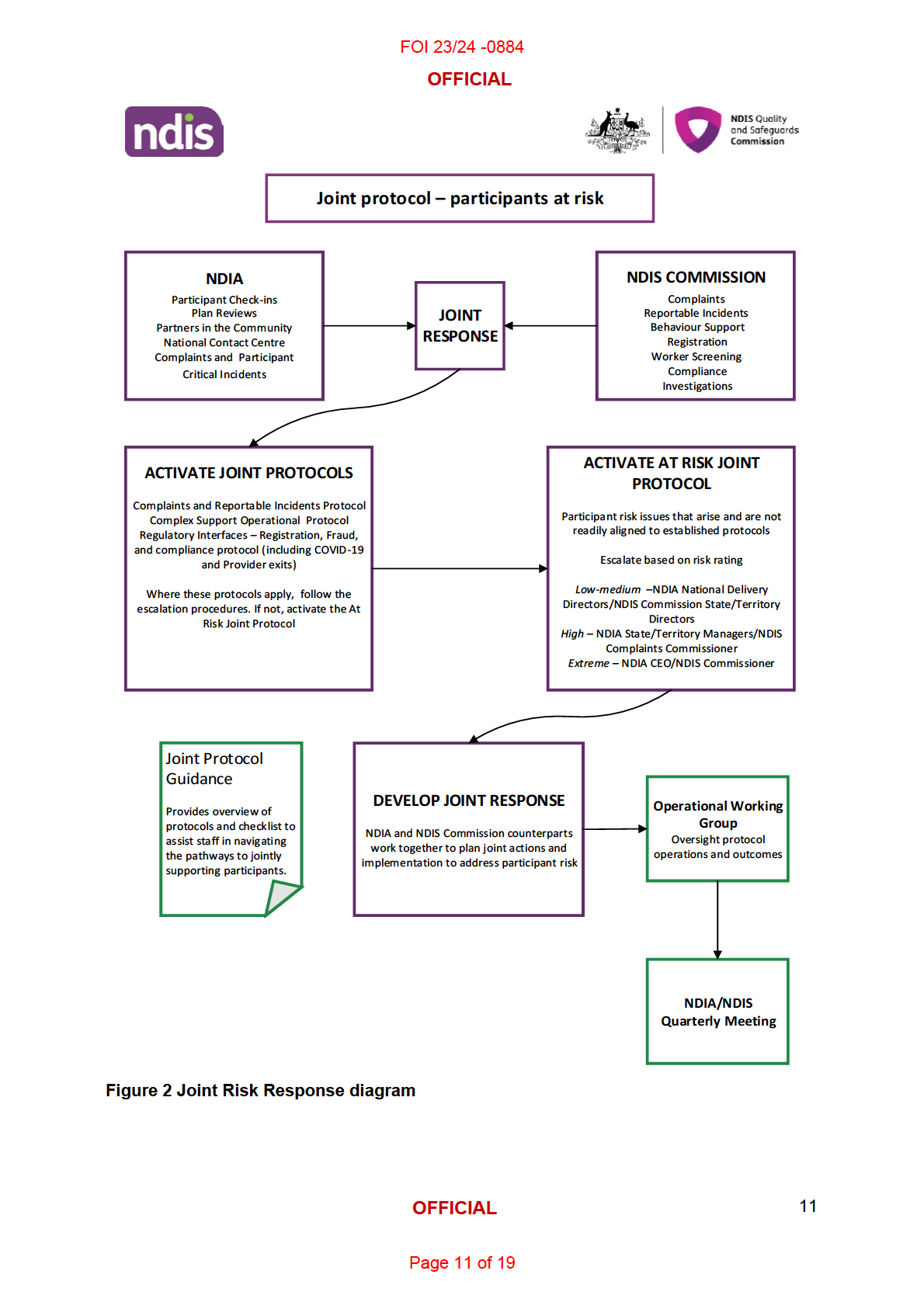
FOI 23/24 -0884
OFFICIAL
6.
Governance
Protocol maintenance
The Operational Protocol Secretariat will be responsible for establishing, maintaining, and
completing protocol reviews through consultation between the NDIA and NDIS Commission
business areas. Reviews for this protocol will occur no later than 6 monthly.
Operational Working group
The NDIA and NDIS Commission business areas will meet every six weeks via a working group
to:
• Develop work flow and work processes between the NDIA and NDIS Commission, for
participants at risk, including a process for developing a joint response/plan.
• Develop shared understanding of data access and exchange to enhance each party’s
capacity to perform legislative functions and improve outcomes for participants.
• Ensure the operational protocol remains fit for purpose, documenting changes to each
agency’s own processes which may impact on the procedures outlined in this protocol.
Regular Meeting Schedule
The working group will meet six-weekly, including relevant state and territory leads, to:
• reconcile and review participant data related at risk participants
• review current processes to work towards best practice; and
• set priorities for next quarter.
Outcomes of the meeting must include administrative actions as well as ensuring alignment and
agreement of issues such as joint communication, provider and participant education and
learning and development activities.
Communication
Development of communication protocols is encouraged to establish effective working
arrangements at the State and Territory level.
Escalation
Issues arising from the shared work of the NDIA and NDIS Commission and operation of these
protocols should be raised at the Branch Manager (SES Band 1) level. If the issue cannot be
resolved, it will be escalated to General Manager (SES Band 2) level.
7.
Related Documents
• NDIA Participant Critical Incident Framework
• NDIA Complaints and Feedback Framework
• NDIA Participant Safety Policy (coming soon)
• NDIS Commission Site Visit Policy
• NDIS Commission NDIS Search Tool Policy
OFFICIAL
12
Page 12 of 19
FOI 23/24 -0884
OFFICIAL
Other Operational Protocols
• Data Access and Transfer
• Complaints Handling and Reportable Incidents
• Complex Supports
• Regulatory Interfaces (Registration, Fraud and Compliance)
o Addendum – Continuity of Supports
o Addendum – Provider Exits
• Market Oversight
OFFICIAL
13
Page 13 of 19
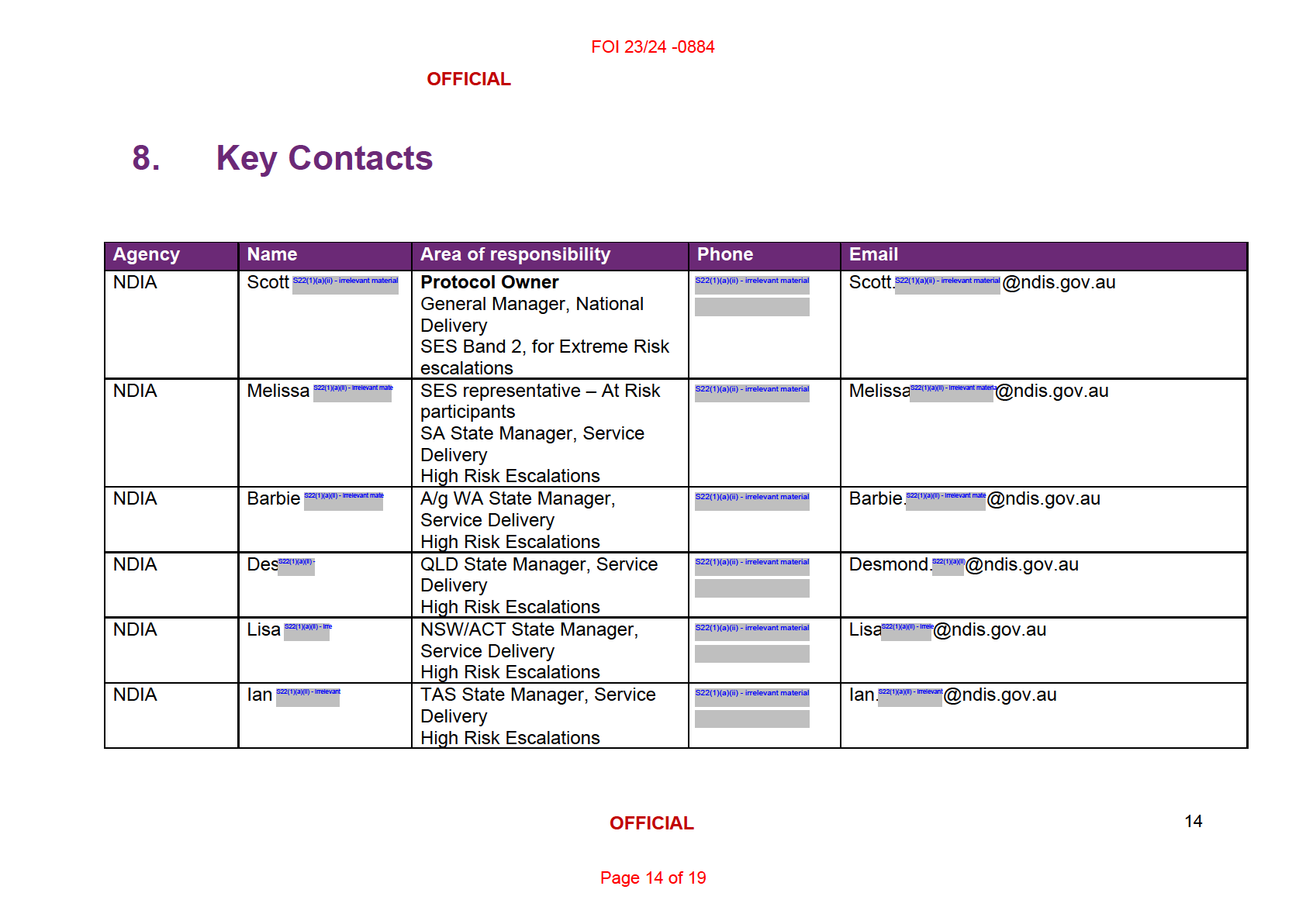
FOI 23/24 -0884
OFFICIAL
NDIA
Tori S22(1)(a)(ii)
- irrelevant m
VIC State Manager, Service
Tori.S22(1)(a)(ii)
@ndis.go
- irrelevant m
S22(1)(a)(ii) - irrelevant material
v.au
Delivery
High Risk Escalations
NDIA
Louise S22(1)(a)(ii) - irrelevan
Territory Manager ACT,
S22(1)(a)(ii) - irrelevant material
Louise.S22(1)(a)(ii) - irrelevant xxxxxxxx@xxxx.xxx.xx
Service Delivery
High Risk Escalations
NDIA
Nathan S22(1)(a)(ii)
- irrelevant
Territory Manager NT, Service
S22(1)(a)(ii) - irrelevant material
Nathan.S22(1)(a)(ii)
@ndi
- irrelevant
s.gov.au
Delivery
High Risk Escalations
NDIA
Pippa S22(1)(a)(ii)
- irrele
National Delivery Division
S22(1)(a)(ii) - irrelevant material
Pippa.S22(1)(a)(ii)
2@ndis.g
- irrele
ov.au
support officer
NDIA
Maddi S22(1)(a)(ii)
- irrelevant materia
Director, Complaints pathway
S22(1)(a)(ii) - irrelevant material
Maddi.S22(1)(a)(ii)
@ndi
- irrelevant materia
s.gov.au
NDIA
Deb S22(1)(a)(ii) - irr
Branch Manager, Technical
S22(1)(a)(ii) - irrelevant material
Deb.S22(1)(a)(ii) @ndi
- irre
s.gov.au
Advisory Branch (TAB)
NDIA
Julie S22(1)(a)(ii)
- irrelevan
Director, Complex Planning,
S22(1)(a)(ii) - irrelevant material
Julie.S22(1)(a)(ii)
@ndi
- irrelevan
s.gov.au
(TAB)
NDIA
Katrin S22(1)(a)(ii)
- irreleva
Assistant Director,
S22(1)(a)(ii) - irrelevant material
Katrin.S22(1)(a)(ii)
@ndis.g
- irreleva
ov.au
Core/Complex Planning (TAB)
NDIS
Sian S22(1)(a)(ii)
- irrelevant ma
Protocol Owner
S22(1)(a)(ii) - irrelevant material
Sian.S22(1)(a)(ii)
@ndi
- irrelevant ma
scommission.gov.au
Commission
Complaints Commissioner
SES Band 2, for High and
Extreme Risk escalations
NDIS
Philip S22(1)(a)(ii)
- irrelev
Branch Head, North Central
S22(1)(a)(ii) - irrelevant material
PhilipS22(1)(a)(ii)
@ndi
- irrelevan
scommission.gov.au
Commission
West (QLD, NT, SA, WA)
National Reportable Incidents
Operations
High Risk Escalations
NDIS
Mahashini S22(1)(a)(ii)
- irrelevant
A/Branch Head, South East
S22(1)(a)(ii) - irrelevant material
Mahashini.S22(1)(a)(ii)
@ndiscommissio
- irrelevant
n.gov.au
Commission
(NSW, ACT, VIC, TAS)
High Risk Escalations
NDIS
Robert S22(1)(a)(ii) - irrel
A/State Director QLD
S22(1)(a)(ii) - irrelevant material
Robert.S22(1)(a)(ii) - irre@ndi
scommission.gov.au
Commission
Low/medium Risk escalations
OFFICIAL
15
Page 15 of 19
FOI 23/24 -0884
OFFICIAL
NDIS
Valli S22(1)(a)(ii)
- irrelevant m
State Director NT
S22(1)(a)(ii) - irrelevant material
Valli.S22(1)(a)(ii)
@ndiscom
- irrelevant m
mission.gov.au
Commission
Low/medium Risk escalations
NDIS
Carrie S22(1)(a)(ii)
- irrelevant m
A/State Director WA
S22(1)(a)(ii) - irrelevant material
CarrieS22(1)(a)(ii)
@ndi
- irrelevant ma
scommission.gov.au
Commission
Low/medium Risk escalations
NDIS
Tim S22(1)(a)(ii)
- irrele
State Director SA
S22(1)(a)(ii) - irrelevant material
Tim.S22(1)(a)(ii) @ndisco
- irrele
mmission.gov.au
Commission
Low/medium Risk escalations
NDIS
Andrew S22(1)(a)(ii)
- irrelevant mate
A/State Director TAS
S22(1)(a)(ii) - irrelevant material
Andrew.S22(1)(a)(ii)
@ndi
- irrelevant mate
scommission.gov.au
Commission
Low/medium Risk escalations
NDIS
Samantha S22(1)(a)(ii) - irreleva
State Director VIC
S22(1)(a)(ii) - irrelevant material
SamanthaS22(1)(a)(ii)
@n
- irrelevant
discommission.gov.au
Commission
Low/medium Risk escalations
NDIS
Mahashini S22(1)(a)(ii)
- irrelevant
State Director NSW/ACT
S22(1)(a)(ii) - irrelevant material
Mahashini.S22(1)(a)(ii)
@ndiscommissio
- irrelevant
n.gov.au
Commission
Low/medium Risk escalations
NDIS
Rowena S22(1)(a)(ii)
- irrelevant materia
Director, Participant Rights
S22(1)(a)(ii) - irrelevant material
Rowena.S22(1)(a)(ii)
@ndiscommissio
- irrelevant materia
n.gov.au
Commission
Policy, Markets and Insight
Division
NDIS
Miriam S22(1)(a)(ii) - irrelevant material
Assistant Director Participant
S22(1)(a)(ii) - irrelevant material
Miriam.S22(1)(a)(ii) - irrelevant xxxxxxxx@xxxxxxxxxxxxxx.xxx.a
Commission
Rights,
u
Policy, Markets and Insight
Division
NDIS
Jan S22(1)(a)(ii)
- irrelevan
National Director Complaints
S22(1)(a)(ii) - irrelevant material
Jan.S22(1)(a)(ii)
@n
- irrelevan
discommission.gov.au
Commission
Strategy
OFFICIAL
16
Page 16 of 19
